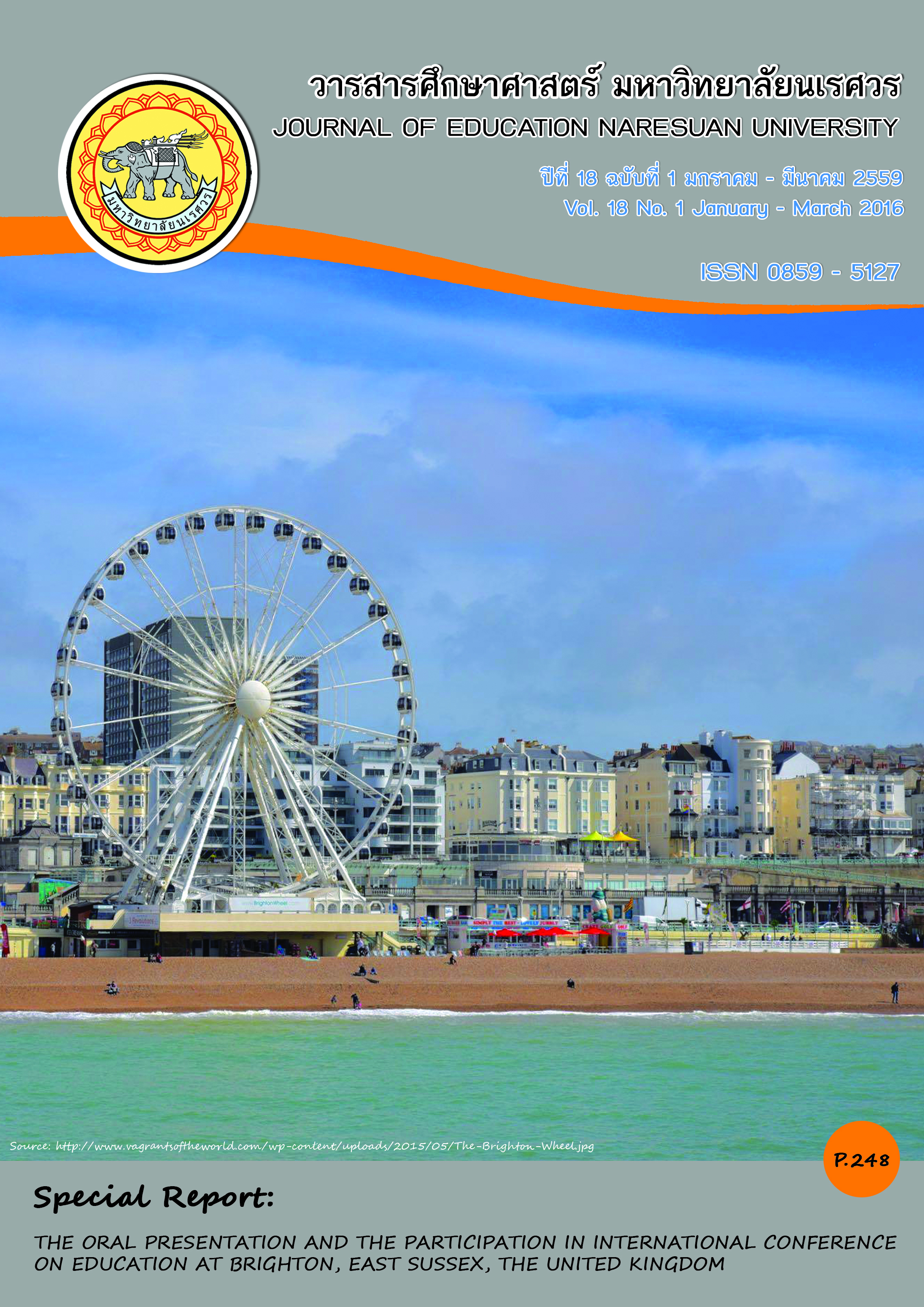การพัฒนารูปแบบการจัดกิจกรรมการเรียนรู้ร่วมกันเพื่อเสริมสร้างความสามารถในการสอนความเป็นพลเมืองสำหรับครูการศึกษาขั้นพื้นฐาน
Main Article Content
Abstract
บทคัดย่อ
การวิจัยครั้งนี้มีวัตถุประสงค์เพื่อพัฒนารูปแบบการจัดกิจกรรมการเรียนรู้ร่วมกัน เพื่อเสริมสร้างความสามารถในการสอนความเป็นพลเมือง สำหรับครูการศึกษาขั้นพื้นฐาน ดำเนินการโดยใช้กระบวนการวิจัยและพัฒนา แบ่งเป็น 4 ระยะ ดังนี้ ระยะที่ 1 การศึกษาแนวคิดความเป็นพลเมืองและการจัดการเรียนรู้เพื่อเสริมสร้างความเป็นพลเมือง โดยการสังเคราะห์เอกสาร การเข้าร่วมประชุมทางวิชาการสถาบันพระปกเกล้า การเข้าร่วมเวทีแลกเปลี่ยนเรียนรู้ของไทยพีบีเอส การเข้าร่วมประชุมปฏิบัติการพัฒนารูปแบบการจัดการเรียนรู้ การสัมภาษณ์ผู้ทรงคุณวุฒิ และสอบถามสภาพการจัดการเรียนการสอนความเป็นพลเมืองของครูสังคมศึกษาในเขตพื้นที่การศึกษาประถมศึกษาของภาคเหนือตอนล่าง ระยะที่ 2 การสร้างและตรวจสอบคุณภาพของรูปแบบ ระยะที่ 3 การทดลองใช้รูปแบบ โดยนำไปทดลองใช้กับครูสังคมศึกษา ชั้นมัธยมศึกษาปีที่ 3 ในโรงเรียนขยายโอกาสทางการศึกษา สังกัดสำนักงานเขตพื้นที่การศึกษาประถมศึกษาเพชรบูรณ์ เขต 2 จำนวน 25 คน ที่ได้มาจากการเลือกแบบเจาะจง (Purposive Selection) ทำการทดลองใช้รูปแบบการพัฒนาครู 4 ขั้นตอน คือ ขั้นตอนที่ 1 พัฒนาครูให้ตระหนักและมีความรู้ความเข้าใจความเป็นพลเมืองและการสอนความเป็นพลเมือง ขั้นตอนที่ 2 พัฒนาครูให้ออกแบบการสอนความเป็นพลเมือง นิเทศติดตามช่วยเหลือ สอนแนะ ปรับปรุงแผน ตรวจแผนการจัดกิจกรรมการเรียนรู้ทาง e-mail ตอนที่ 3 พัฒนาครูให้สอนเป็นที่เชื่อมโยงการสอนทั้งในและนอกห้องเรียน โดยเตรียมความพร้อมก่อนสอน ครูปฏิบัติการสอน ในระหว่างที่ครูปฏิบัติการสอนได้ดำเนินการนิเทศติดตามประเมินความสามารถในการสอนความเป็นพลเมือง ขั้นตอนที่ 4 พัฒนาครูให้เห็นกระบวนการมีส่วนร่วมกับชุมชนผู้เกี่ยวข้องและนักเรียน รวมการพัฒนาครูทั้งสิ้น 82 วัน โดยใช้แบบแผนการวิจัยแบบ One Group Pretest-Posttest Design ระยะที่ 4 การประเมินรูปแบบ เป็นการประเมินความคิดเห็นของครู นักเรียน และชุมชนผู้เกี่ยวข้องที่มีต่อการเรียนรู้ที่เกิดจากรูปแบบในด้านปัจจัยนำเข้า ด้านกระบวนการ และด้านผลที่ได้จากการดำเนินการสอน ผลการวิจัย พบว่า
1. ผลการศึกษาแนวคิดเกี่ยวกับความเป็นพลเมือง พบว่า 1) ลักษณะสำคัญของความเป็นพลเมือง ประกอบด้วย 6 ประการ คือ มีความรู้รับผิดชอบและพึ่งตนเองได้ เคารพกติกาและเคารพกฎหมาย มีคุณธรรมจริยธรรม มีความรู้ทางการเมืองเศรษฐกิจและสังคม มีส่วนร่วมกิจกรรมของชุมชนและสังคม ดำรงชีวิตอย่างมีปฏิสัมพันธ์กับคนอื่นๆ 2) การปรับความรู้ความเข้าใจในการสอนความเป็นพลเมืองต้องเน้นการปลูกฝังพัฒนาจิตสำนึกความเป็นพลเมืองด้วยการเรียนรู้ร่วมกันและเน้นลงมือปฏิบัติจริงที่ใช้แหล่งเรียนรู้สถานการณ์ปัญหาจริงและมีส่วนร่วมกับชุมชน 3) การพัฒนาความสามารถในการสอนด้วยกิจกรรมการเรียนรู้ร่วมกันประกอบด้วย เสนอสถานการณ์ปัญหา วางแผนระดมความคิด เชื่อมโยงค้นคว้าแก้ปัญหา สร้างสรรค์ผลงาน นำเสนอและประเมิน
2. ผลการสร้างและการตรวจสอบคุณภาพของรูปแบบ พบว่า รูปแบบประกอบด้วย ความเป็นมา และความสำคัญของรูปแบบ แนวคิดและทฤษฎีพื้นฐานของรูปแบบ หลักการ จุดมุ่งหมาย เนื้อหา กระบวนการพัฒนาครู การวัดและประเมินผล และปัจจัยเกื้อหนุนที่นำไปสู่ความสำเร็จ โดยมีกระบวนการ พัฒนาครูเป็น 4 ตอน ที่สร้างขึ้นเรียกว่า AISEE Model ดังนี้ 1) มุ่งเรียนรู้เตรียมการเชิงบวก (A: Aims to provide a positive learning) 2) ปฏิสัมพันธ์ออกแบบวางแผน (I: Interaction in designing) 3) ร่วมรับผิดชอบปฏิบัติการสอน (S: Sharing the teaching responsibility) 4) แลกเปลี่ยนและประเมิน (EE: Exchange and Evaluation) และขั้นการเรียนรู้ร่วมกันของครู 5 ขั้น คือ 1) สร้างความตระหนักเรียนรู้ปัญหาจากประสบการณ์เดิม 2) วิเคราะห์ให้เหตุผลและสะท้อนความคิด 3) เชื่อมโยงสรุปความคิดรวบยอด 4) วางแผนและนำสู่การปฏิบัติ 5) สรุปประเมินและประยุกต์ใช้ ซึ่งผลการตรวจสอบคุณภาพโดยผู้เชี่ยวชาญ พบว่า รูปแบบที่พัฒนาขึ้นมีความเหมาะสมและสอดคล้องอยู่ในระดับมาก
3. ผลการทดลองใช้รูปแบบ พบว่า 1) ครูการศึกษาขั้นพื้นฐาน มีความรู้ความเข้าใจเกี่ยวกับความเป็นพลเมืองและการสอนความเป็นพลเมือง หลังการพัฒนาสูงกว่าก่อนการพัฒนาอย่างมีนัยสำคัญทางสถิติที่ระดับ .01 2) ครูการศึกษาขั้นพื้นฐานมีความสามารถในการสอนความเป็นพลเมือง หลังการพัฒนามีค่าเฉลี่ยอยู่ในระดับดี
ซึ่งสูงกว่าเกณฑ์ ระดับดี ( = 3.51) อย่างมีนัยสำคัญทางสถิติที่ระดับ .01
4. ผลการประเมินรูปแบบ พบว่า ด้านปัจจัยนำเข้า ด้านกระบวนการ และด้านผลที่ได้จากการดำเนินการสอนของครูการศึกษาขั้นพื้นฐานอยู่ในระดับมาก ส่วนนักเรียนประเมินความคิดเห็นทีมีต่อการเรียนรู้ที่เกิดจากรูปแบบและชุมชนผู้เกี่ยวข้องประเมินความคิดเห็นที่มีต่อการมีส่วนร่วมที่เกิดจากรูปแบบอยู่ในระดับมาก
คำสำคัญ: รูปแบบการจัดกิจกรรมการเรียนรู้ร่วมกัน/ ความเป็นพลเมือง/ ความสามารถในการสอน
THE DEVELOPMENT OF COLLABORATIVE LEARNING MODEL TO ENHANCE CITIZENSHIP INSTRUCTIONAL COMPETENCES FOR BASIC EDUCATION TEACHERS
Abstract
The research aimed at developing collaborative learning model to enhance citizenship instructional competences for basic education teachers. The research procedure comprised of 4 phases; phase 1 studying the basic concept of citizenship and learning management for enhancing citizenship instructional competences with analyzing and synthesizing concepts and theories through relevant documents and research findings, from the thirteenth annual King Prajadhipok Institute congress (13th KPI Congress): Citizenship and the future of Thai democracy, join a forum exchange with Democratic Citizenship Education-DCE working group at Thai PBS, workshop participants developed a learning citizenship, experts interviews and conditions for teaching citizenship of social teachers in the primary educational service area of the lower North. Phase 2 constructing and proving efficiency of instructional model. Phase 3 implementing the instructional model of which the purposive selection was 25 Social Science teachers teaching at Mathayomsuksa 3 of the expansion school of Phetchabun primary educational service area office 2. The study conducted in developing 4 steps: step 1 teachers to be awareness and content knowledge understanding about citizenship and teaching citizenship, step 2 developing teachers on teaching design and next visited for coaching &mentoring, step 3 developing teachers on teaching in the fieldwork at school, and be supervised and evaluated on citizenship competences, step 4 developing teachers to view the processes involved with the community and students. The total time used for teachers development were 82 days. The samples were tested via one group pretest–posttest design. Phase 4 evaluationing model of which the opinions of teachers, students and professional learning community were evaluated.
The results of the research were as follows:
1. The basic concept used in citizenship were 1) Main characteristics of citizenship were 6 components; (1) knowledge, responsibility and be self-relianer (2) respects rule and law (3) morality and ethics (4) knowledge in politics, economics and society (5) community activities and social participation and (6) life and interaction with others. 2) Adjust their knowledge and understanding in teaching citizenship, emphasis on awareness and active learning with source and problem-based learning 3) Develop the ability to teach with collaborative learning of 5 steps (1) proposing the problem situation (2) planning collaboratively (3) linking research to solve problem (4) creating new jobs (5) presenting and evaluating.
2. The model consisted of background and importance of the model, concepts and theories, principles, aims, contents, development process, measurement and evaluation and supporting factors that lead to success were found components: AISEE Model; 1) A: Aims to provide a positive learning 2) I: Interaction in designing 3) S: Sharing the teaching responsibility 4) EE: Exchange and Evaluation. Using collaborative learning of teachers; awareness learning from previous experience problems, analytical reasoning and reflective thinking, connecting and summarized as being conceptual, planned and put into practice, summary of evaluation and application. The experts agreed to the quality of the developed model found appropriate and consistent at a high level.
3. The implementation of model found that; 1) the posttest of citizenship and instruction of basic educational teachers through the developed model were higher than those of their pretest at the .01 level of significance. 2) After developing, the basic educational teachers’ citizenship instructional competences was at a high level ( = 3.74) which is higher than the criterion at the .01 level of significance.
4. The evaluation of the model found that input, process and output of the basic educational teachers were at a high level, students and professional learning communities were at a high level.
Keywords: Collaborative Learning Model/ Citizenship/ Instructional Competences
Article Details
The owner of the article does not copy or violate any of its copyright. If any copyright infringement occurs or prosecution, in any case, the Editorial Board is not involved in all the rights to the owner of the article to be performed.


